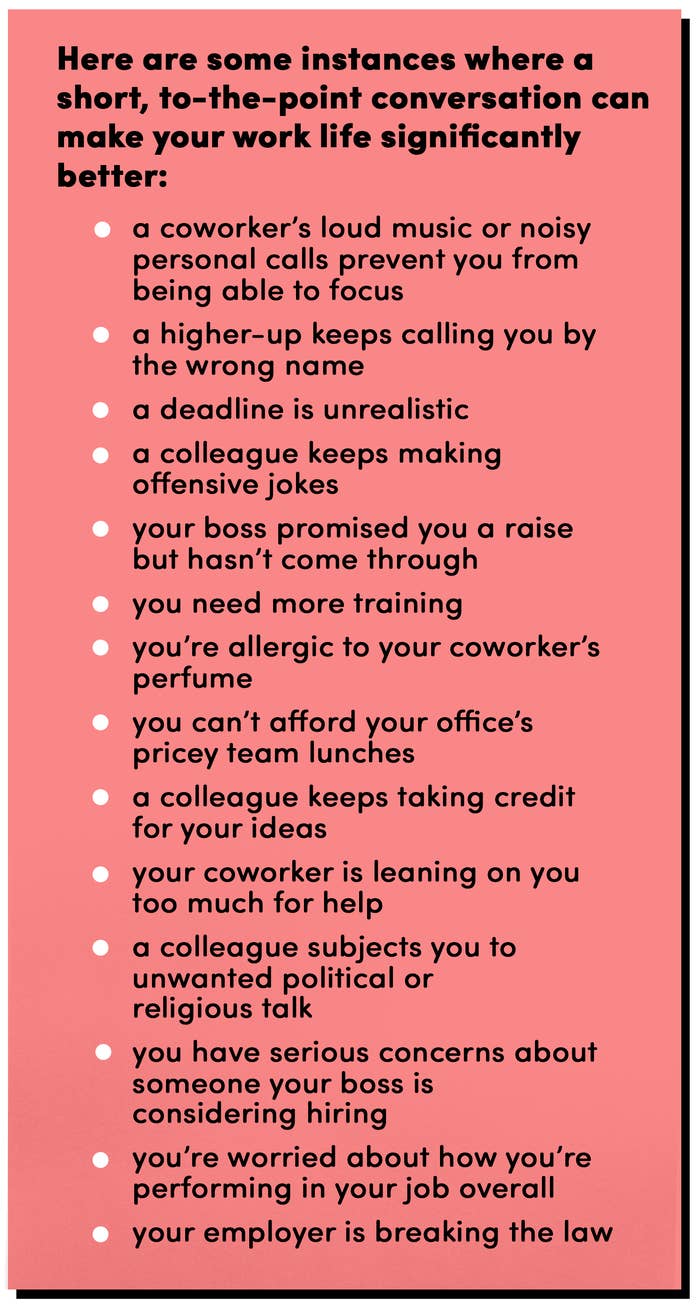
As a workplace advice columnist — I’ve written the Ask a Manager advice blog for 11 years now — I’ve received my share of weird queries about office life, like the person who wanted all her coworkers to call her boyfriend her “master” and the person who had to share a bed with a coworker on a business trip. I’ve also received plenty of the more mundane sorts of letters you’d expect a work advice columnist to get on salary negotiation and micromanaging bosses. By my calculations, I’ve received more than 100,000 pleas for advice since I started the column. And those letters have taught me a lot about our collective experiences at work — like how guilt and inertia can keep us in bad jobs long after the point we should leave, and the widespread hatred of people who take their calls on speakerphone.
But the biggest lesson I’ve learned? When something at work is bothering you, you should speak up.
It might sound obvious. But judging by my mail, it’s the number one thing that people struggle with over the course of their careers. I hear from a lot of people whose questions boil down to, “My colleague is doing Annoying Thing X [dumping last-minute work on me as I’m walking out the door at night/assuming I’ll drive them home every night/spitting on me while they talk/etc.]. How can I get them to stop without actually saying anything to them about it?” And sure, of course we want people to stop annoying us without needing to have an awkward conversation! But in the vast majority of cases, that’s not really an option.
To be clear, in some cases the annoying behavior is egregious enough that you actually can skip talking to the person directly and go straight to their manager or HR. But those cases are the exception, not the rule. You definitely don’t want to go to HR about your coworker who spits when he talks. You’ll look like you can’t manage your own work relationships, and they’re likely to tell you to go back and talk to your coworker directly anyway.

In most cases, if someone is doing something that upsets or annoys you, and you want them to stop, the only way to make that happen is to speak up and tell them so. So you have to decide: Are you willing to speak up and have the conversation? Or do you want to avoid that conversation so much that you’re willing to continue dealing with the behavior that’s bugging you? Those are usually your only two choices. And too often, people choose to say nothing, because they can’t figure out what to say or even how to start the conversation. Instead, they leave the problem unresolved, while their irritation festers and grows.
In some ways, that’s understandable. Your job is your livelihood, so of course you’re wary of injecting tension or weirdness into your relationships with colleagues. Your quality of life at work often depends on having a decent relationship with your coworkers and especially with your boss, who controls everything from what work assignments you get to whether you’ll still have a job next week. You might worry about being perceived as “difficult” if you speak up (a particularly valid concern for people of color, for example). So the stakes are high.
“My colleague is doing Annoying Thing X. How can I get them to stop without actually saying anything to them about it?"
But the stakes are high if you don’t speak up, too. When the issue is serious — for example, if you’re not getting paid on time — not speaking up could mean not paying your bills. But even when the issue isn’t so crucial — even when it’s, say, asking your coworker to turn his music down or to stop calling you “m’lady” — not speaking up means not having perfectly reasonable conversations, all in the name of avoiding pretty minor awkwardness. If you speak up — not adversarially, not aggressively, just calmly and matter-of-factly — you’ll build a reputation as someone who’s able to navigate tough situations with relative grace. You’ll also significantly improve your quality of life at work, because when you speak up appropriately, you improve your working conditions and your relationships. (You also might find that those skills are transferable to life outside of work, which is an added bonus.)
But the “not adversarially” part is pretty crucial. While lots of people choose not to speak up at all and suffer in silence, it’s also true that too many people speak up badly. They’re too aggressive and they come in too hot, and as a result their perfectly legitimate concerns are lost in the messaging.

Your tone and the way you frame the conversation will play a huge part in determining the outcome. You want to sound calm, matter of fact, and, collaborative. Think of the tone that you’d use if you were trying to solve a work-related problem with a colleague and you hadn’t spent the last two nights lying awake, mustering the nerve to initiate the conversation. That’s the tone you’re aiming for.
Most of the time, speaking up will probably go better than you think it will. Most people want to know if they’re doing something that’s annoying the crap out of you. Most managers want to know if someone on their staff is deeply unhappy about something. Most people won’t be upset that you initiated the conversation and you aren’t going to come across as a jerk to reasonable people.
In most cases, if someone is doing something that upsets or annoys you, and you want them to stop, the only way to make that happen is to speak up and tell them so.
Of course, you do need to be realistic. In some cases, the conversation might cause tension or awkwardness or make someone angry with you. These things happen! They happen less than people fear they will, but they’re certainly a possible outcome. But most of the time the worst thing that will happen is some fleeting awkwardness, followed by a return to normalcy. That’s not such a high price to pay.
So the next time you’re frustrated by something at work — whether it’s with your boss or with a colleague — try speaking up. Hopefully you’ll find that speaking up doesn’t have to mean alienating people or causing tension in your relationships. You can be direct without being rude, and you can be assertive without being disagreeable.
This article is adapted from Alison Green’s new book, Ask a Manager: How to Navigate Clueless Colleagues, Lunch-Stealing Bosses, and the Rest of Your Life at Work.
Read more:
